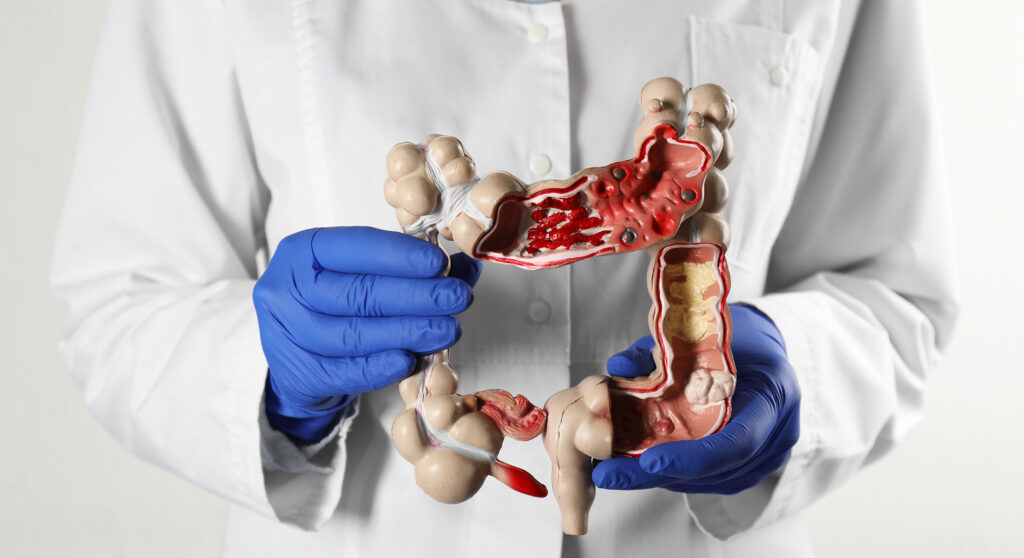Clostridioides difficile infection (CDI), commonly referred to as C. difficile or C. diff, is a potentially life-threatening bacterial infection that primarily affects the colon. It is a leading cause of healthcare-associated infections worldwide and is commonly linked to antibiotic use. CDI can range from mild diarrhea to severe complications, including toxic megacolon and sepsis.

Causes and Risk Factors
CDI is caused by the bacterium Clostridioides difficile, which produces toxins that inflame the colon, leading to symptoms such as diarrhea and colitis. The primary risk factors include:
- Antibiotic Use: Disrupts gut microbiota, allowing C. difficile overgrowth.
- Hospitalization and Long-Term Care Facilities: Increased exposure to spores.
- Age: Older adults are at a higher risk.
- Weakened Immune System: Conditions such as cancer or organ transplants increase susceptibility.
- Prolonged Proton Pump Inhibitor (PPI) Use: Alters stomach acidity, promoting bacterial growth.
Symptoms of Clostridioides Difficile Infection
Symptoms of CDI vary in severity and include:
- Mild to Moderate Cases:
- Watery diarrhea (three or more times a day for two or more days)
- Abdominal cramping and tenderness
- Severe Cases:
- Severe diarrhea (10+ episodes per day)
- Fever
- Nausea and loss of appetite
- Dehydration
- Pseudomembranous colitis (colon inflammation with yellow-white plaques)
- Toxic megacolon and sepsis (in rare cases)
Pathophysiology of CDI
When C. difficile colonizes the gut, it releases two primary toxins—TcdA and TcdB—which cause inflammation, fluid secretion, and cellular damage. The disruption of the gut microbiota, often due to antibiotic therapy, allows C. difficile to thrive.
Diagnosis of Clostridioides Difficile Infection
Diagnosis typically involves laboratory tests to detect C. difficile toxins in stool samples. Common diagnostic methods include:
- Enzyme Immunoassay (EIA): Detects toxins A and B but has low sensitivity.
- Polymerase Chain Reaction (PCR): Identifies toxin-producing C. difficile genes with high accuracy.
- Glutamate Dehydrogenase (GDH) Test: Used as a screening tool.
- Colonoscopy (in severe cases): May reveal pseudomembranous colitis.
Treatment Options
The treatment of CDI depends on the severity of infection:
First-Line Antibiotics
- Mild to Moderate CDI:
- Vancomycin (oral)
- Fidaxomicin (preferred for recurrence prevention)
- Severe CDI:
- Vancomycin (higher doses, oral or rectal route)
- Metronidazole (only if oral vancomycin is unavailable)
Fecal Microbiota Transplant (FMT)
For recurrent CDI, fecal microbiota transplantation (FMT) is an effective therapy that restores a healthy gut microbiome by transferring stool from a healthy donor.
Surgery
In extreme cases, such as toxic megacolon or perforation, colectomy (removal of the colon) may be necessary.
Prevention Strategies
Preventing CDI involves a combination of infection control measures and responsible antibiotic use:
- Antibiotic Stewardship: Prescribe antibiotics only when necessary.
- Hand Hygiene: Wash hands with soap and water (alcohol-based sanitizers are ineffective against spores).
- Environmental Cleaning: Use bleach-based disinfectants in healthcare settings.
- Probiotics: May reduce the risk of CDI in high-risk individuals.
- Isolation Precautions: Infected patients should be isolated to prevent transmission.